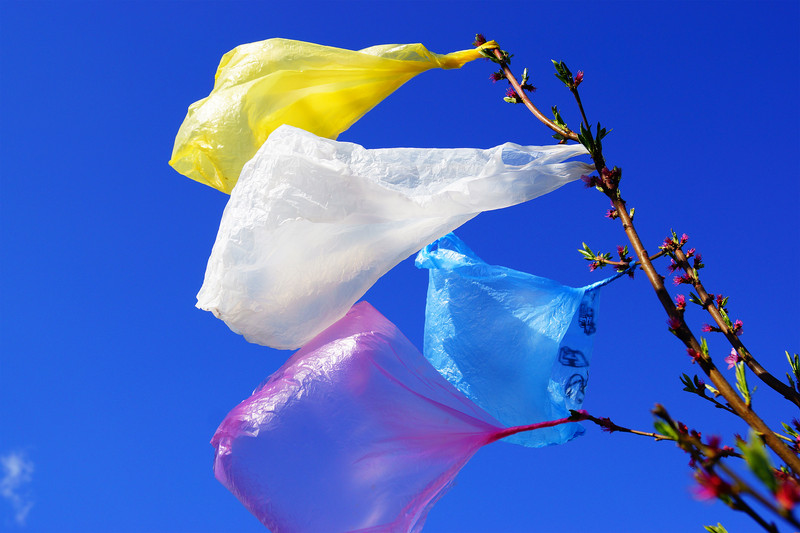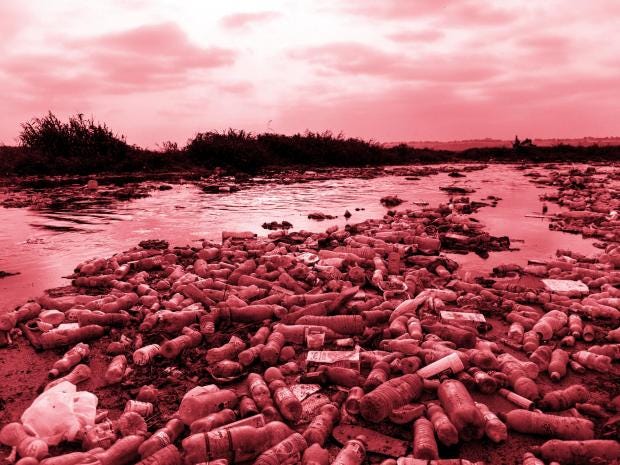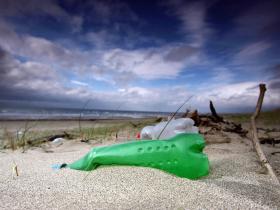Plastics are one of the UK’s top ten imports and exports. Each year the UK imports £13bn of plastics material, products and machinery and exports £8.4bn.
Understanding Plastics Trade
Brexit and the plastics industry - British Plastics Federation
Why is the EU Plastics Industry concerned about BREXIT? - Plastribution
Meanwhile, the politics of plastic is hotting up, with the UK promising to lead the world in dealing with plastic:
The U.K. will be a global leader against the “scourge” of plastic pollution, Theresa May will promise ... Environment Secretary and leading Brexiteer Michael Gove has promised a “Green Brexit” once the U.K. leaves the EU.
Brexit and the plastics industry - British Plastics Federation
Why is the EU Plastics Industry concerned about BREXIT? - Plastribution
Meanwhile, the politics of plastic is hotting up, with the UK promising to lead the world in dealing with plastic:
The U.K. will be a global leader against the “scourge” of plastic pollution, Theresa May will promise ... Environment Secretary and leading Brexiteer Michael Gove has promised a “Green Brexit” once the U.K. leaves the EU.
Theresa May pledges Brexit Britain will lead global fight against plastic pollution – POLITICO
And the EU is promising to introduce a tax on plastic - as a green measure, but also to raise funds:
EU plans new Europe-wide tax on plastics to help plug £20bn Brexit blackhole | The Independent
But who started the anti-plastic policies?
Theresa May ridiculed in European Parliament for claiming credit for EU regulations
Scrapping credit card charges and plastic bag fees were Brussels regulations
Jon Stone Brussels 4 days ago
 Theresa May has been ridiculed in the European Parliament after her Government took credit for two major EU regulations in the space of a week – without mentioning where the laws had come from.
Theresa May has been ridiculed in the European Parliament after her Government took credit for two major EU regulations in the space of a week – without mentioning where the laws had come from.The Prime Minister spent part of last week hailing the introduction of a ban on credit card charges, as well as mandatory fees for plastic bags in shops, as a win for consumers and the environment. But despite Conservative-branded publicity being prepared for social media and a major set-piece speech about the environment off the back of the latter policy, the two laws were in fact EU regulations and directives.
The irony of the party delivering Brexit trumpeting the policies imposed by Brussels was not lost on Guy Verhofstadt, the European Parliament’s Brexit coordinator, who said there was clearly “widespread” confusion in Britain over the role of the EU. “I see the confusion is a little bit widespread in Britain at the moment. Michael Gove for example has forgotten that the ban on plastic bags is an EU regulation,” he said, speaking on Tuesday morning in Strasbourg. “The Prime Minister, Ms May, doesn’t know, apparently that the abolition of charges on credit cards is a consequence of a directive of the EU.”
A spokesperson for the UK’s Department for Environment, Food and Rural Affairs disputed the claims about EU regulation being the source of the plastic bag charges. “It is not true to claim that our plastic bag charge is a result of EU regulation. We set out our plans before the EU and we have gone further than EU regulations require,” she said.
Theresa May ridiculed in European Parliament for claiming credit for EU regulations | The Independent
UK silent on EU origins of plastic bags law

By PETER TEFFER
BRUSSELS, 10. JAN, 09:27
UK prime minister Theresa May and her environment minister Michael Gove are due to unveil a broadening of a ban on free plastic bags to tackle the UK's "throwaway culture", UK media reported on Wednesday (10 January). A mandatory 5p charge on plastic bags will apply to all shops in England, including those with fewer than 250 employees who had been exempt from the rule until now.
BRUSSELS, 10. JAN, 09:27
UK prime minister Theresa May and her environment minister Michael Gove are due to unveil a broadening of a ban on free plastic bags to tackle the UK's "throwaway culture", UK media reported on Wednesday (10 January). A mandatory 5p charge on plastic bags will apply to all shops in England, including those with fewer than 250 employees who had been exempt from the rule until now.
 But while the news is framed as the Conservative government showing its greener side, other motives are at play as well.
But while the news is framed as the Conservative government showing its greener side, other motives are at play as well.What has gone mostly unreported in the UK is that the plastic bag charge is needed to fulfil a requirement in an EU directive. In 2015, the UK government and its 27 European counterparts unanimously agreed to new pan-European rules on plastic bags. A large majority of the European Parliament – 539 votes in favour, 51 against, 71 abstentions – also supported the directive.
The directive requires national governments to do at least one of two things: either ban shops from giving away free lightweight plastic bags, or to come up with other measures that will reduce plastic bag consumption drastically. If member states choose the second option, they have to make sure that by the end of 2019, their citizens use no more than 90 such bags per year. By the end of 2025, plastic bag consumption per capita has to be down to 40.
The deadline for putting in place the first option – charging plastic bags – is 31 December 2018. Several member states introduced a mandatory surcharge on plastic bags as of 1 January 2018, including Greece, Italy, and Slovakia.
While the UK government's motives may be inspired by becoming "the first generation to leave the natural environment in a better state than we inherited", as quoted by government spokesmen on separate occasions, the EU angle is noticeable by absence. The 2015 bill which introduced the 5p charge for shops with more than 250 employees does not even mention the EU or the directive, unlike transposition bills in other EU countries.
Then again, environment secretary Michael Gove, a major figurehead for the Leave campaign, may want to portray the success of the 5p charge as a domestic affair. Since the ban was in place, single-use plastic bags consumption has dropped by almost 90 percent.
UK silent on EU origins of plastic bags law - EU Observer
Back in 2014, there was already 'a power struggle of the UK versus the EU' happening over plastic - with an Italian company lobbying for a ban on non-biodegradable bags:
EU bag law stirs up Italy-UK row over "good" plastic and bad
Trying to be a little less political, here's a comparison of British and EU policies from the Independent:
How does the new EU plastic strategy compare to the UK’s plans to cut pollution?

Josh Gabbatiss Science Correspondent 2 days ago
Plastic waste is the environmental issue of the moment.
Long acknowledged by ocean scientists, Blue Planet II brought the threat of marine plastic pollution into the nation’s living rooms. Viewers saw the horrific impact that long-lived plastics could have on underwater environments when creatures accidentally consume or become trapped in them.
Since then, the Government has made plastic waste a centrepiece of its November budget, as well as its recently announced 25 year plan for the environment. In recent months we have also seen the UK making moves to tackle plastic bottles, disposable coffee cups and microbeads in cosmetics.
Meanwhile, as China bans imports of “foreign garbage”, the UK is under more pressure than ever to find new ways to deal with the mountains of plastic waste the country produces every year.
Now, the EU has thrown its hat into the ring with the announcement of a “European strategy for plastics in a circular economy”. Some environmentalists have already commended the strategy for being more substantial than UK proposals, indicating that while the UK Government has gone big on anti-plastic rhetoric, it has not supported this with ample legislation.
“Europe has thrown down the low-plastic gauntlet for Mr Gove to show if a post-Brexit UK really will be an environmental leader,” said Julian Kirby, plastic and waste campaigner at Friends of the Earth.
Chancellor Philip Hammond said he wanted to make the UK “a world leader in tackling the scourge of plastic,” and a Defra spokesperson has stated this mission is "a critical part of our Green Brexit plans".
But as Brexit looms, how do British proposals weigh up against those of our European neighbours?
Legislation to make businesses deal with plastics
A key sticking point for many on the announcement of the Government’s 25 year environment plan was the lack of firm legislation emerging from it. For a document heralded by its authors as a way to leave the environment “in a better state than we found it”, some experts said it was not concrete enough to make a real, long-term difference.
“We will encourage manufacturers to take responsibility for the impact of their products, and rationalise the number of different types of plastic they use,” said Theresa May on the launch of the plan.
The key word here may have been “encourage”.

READ MORE: Plastic packaging to be recyclable by 2030 as part of new EU strategy
“The European Union is always more comfortable putting in place rules and regulations that require action from businesses,” Mike Childs, head of policy at Friends of the Earth, told The Independent. “The UK is much more inclined to ask for voluntary measures."
Such requests are great when companies like Iceland and Wagamama implement measures to cut plastic use, but for real change to take place there is a need for rules and regulations. “This is why we have been a laggard on the environment for so many years, and why the European Union has improved our performance,” said Mr Childs.
Making recycling easier and more widespread
The key take-home message from the EU’s new plastic strategy was its goal to improve recycling rates in Europe. Currently only 30 per cent of the 25 million tonnes of plastic waste produced across the continent is recycled annually.
This is what prompted EU policy makers to call for “a more circular economy” in which recycling and reuse are encouraged, and they have put their money where their mouth is by pledging €100m (£89m) to finance the development of “smarter and more recyclable plastics materials”.

READ MORE Theresa May’s environment plan is ‘fundamentally flawed’
“The EU’s announcement was more ambitious in terms of the timeline they are looking at,” Dr Lyndsey Dodds, head of marine at WWF told The Independent. The EU intends to make all plastic packaging on the European market recyclable by 2030, while the UK is aiming to achieve “zero avoidable plastic waste” – but not until 2042.
As for actual targets for the proportion of waste that is recycled (and not just recyclable), in 2015 the European Commission proposed that by 2025 at least 55 per cent of all plastic packaging should be recycled. This has not changed with the new strategy, though environmentalists have indicated they would like a more ambitious target.
As a current member of the single market, the UK has the same recycling goal, and the Government has indicated this will not change following Brexit.
Plastic bags, microbeads and single-use plastics
EU policy makers have praised the UK for its progressive approach on plastics, and there have certainly been a handful of measures that have staked the nation’s claim as a “world leader” in tackling plastic, just as the Chancellor wanted.
The ban on microbeads in cosmetic products came into force at the beginning of January in the UK. It is estimated that up to 300,000 tonnes of microplastics – including microbeads – are released into the environment every year in the EU. While the EU’s new strategy said it would “take measures to restrict the use of microplastics in products,” the form such measures will take remains to be seen.
“The microbead ban is brilliant, and the UK Government has been ahead of the game in that regard,” said Dr Dodds. “Equally the plastic bag tax has been successful, and has greatly reduced consumption of plastic bags.”
READ MORE:
Wagamama to end use of plastic straws
Iceland to go 'plastic-free' for own products in landmark announcement
Scotland to ban plastic cotton buds from being made
The 5p charge on plastic bags has been applauded for apparently reducing use by 85 per cent. However, there has been some controversy as the UK Government appeared to take credit for the policy’s success, despite claims it originated from EU regulations.
“I see the confusion is a little bit widespread in Britain at the moment. Michael Gove for example has forgotten that the ban on plastic bags is an EU regulation,” Brexit coordinator Guy Verhofstadt told European Parliament recently.
In response, a Defra spokesperson said: "It is not true to claim that our plastic bag charge is a result of EU regulation. We set out our plans before the EU and we have gone further than EU regulations require".
While British and European politicians can quibble about who came up with what policy, the truth is that like the UK’s strategy, the EU’s new goals still require plenty of fleshing out. Though their recycling targets are more ambitious, many of the actual ways of dealing with plastic are left ambiguous in the new strategy, at least for the time being.
With methods for reducing single-use plastic consumption and dealing with abandoned fishing gear due from the EU later this year, it remains to be seen how helpful they will be for tackling what is, after all, an issue that transcends borders.
How does the new EU plastic strategy compare to the UK’s plans to cut pollution? | The Independent
.
.
.

No comments:
Post a Comment